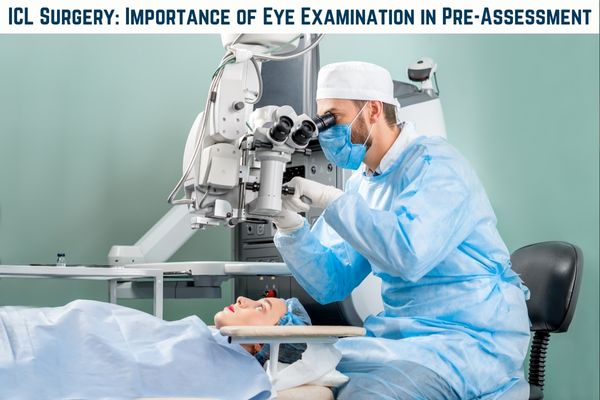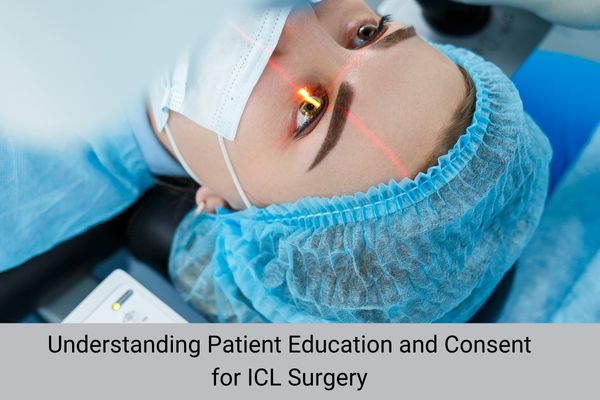Objective
The objective of this article is to educate potential candidates for ICL (Implantable Contact Lens) Surgery about the importance of undergoing a pre-assessment before the procedure. It highlights the various tests and evaluations involved in the pre-assessment process, such as eye health examinations, pupil and corneal mapping, and overall health assessments. The article aims to inform readers about how these pre-surgery assessments help determine if they are suitable candidates for ICL surgery, ensure their eyes are healthy, and increase the likelihood of a successful outcome. Additionally, it outlines the essential steps of the patient education and consent process, as well as post-operative care, to provide a comprehensive understanding of what to expect before, during, and after the surgery. Ultimately, the article seeks to empower individuals with the knowledge to make informed decisions regarding their eye health and vision correction options.
Introduction
If you’re considering ICL Surgery (Implantable Contact Lens Surgery) as a solution for vision correction, undergoing a pre-assessment is a crucial step in ensuring the success of the procedure. This comprehensive evaluation helps determine if you’re an ideal candidate for Implantable Lenses and ensures that any underlying issues are addressed before the surgery. The pre-assessment process involves a variety of tests and consultations that allow the surgeon to assess your eye health, vision needs and overall health status. Here’s why pre-assessment is so important for anyone seeking ICL Eye Surgery.
What is Involved in the Initial Consultation for ICL Surgery?
The initial consultation for ICL Surgery is an essential step in the process. During this meeting, the surgeon will discuss your vision needs, medical history and expectations for the procedure. It’s important to be open and transparent about your lifestyle, daily activities and any concerns you may have. This conversation will help the surgeon understand your specific needs, such as whether you’re considering a Multifocal ICL or need a lens for single vision correction. A detailed discussion about your eye health and any previous vision treatments will also guide the surgeon in recommending the most suitable course of action for your implantable contact lens surgery.
What Does ICL Surgery Ensures Eye Examination During the Pre-Assessment?
A thorough eye examination is at the core of the ICL pre-assessment. The examination typically includes tests to assess your visual acuity (how well you can see), refraction (how light is bent as it passes through your eye) and an evaluation of any eye conditions like cataracts or glaucoma. These tests are essential to ensuring that there are no underlying issues that could impact the outcome of the surgery or interfere with the healing process. The surgeon will evaluate the shape and size of your cornea, as well as the health of the retina, optic nerve and other components of your eye.
Why is Pupil and Corneal Mapping Important in ICL Pre-Assessment?

Pupil and corneal mapping play a critical role in ICL surgery pre-assessment. One of the most important tests conducted during this phase is corneal topography, which maps the curvature and thickness of your cornea. Since the placement of the ICL Lens relies heavily on the corneal anatomy, this mapping helps determine if your eyes are suitable for the lens placement. Corneal mapping ensures the surgeon can choose the correct lens power and orientation, ultimately improving the accuracy of the procedure and ensuring the best visual outcomes.
Testimonials
“I would be completely happy to see this doctor again“
What Happens During a Dilated Eye Examination for ICL lens?
A dilated eye examination is another essential component of the pre-assessment for Implanted Contact Lenses. During this test, the surgeon will use special eye drops to dilate your pupils. This allows them to get a clearer view of the retina, optic nerve and the overall health of the inside of your eye. Dilating the eyes provides a better assessment of the structures in your eye that may not be visible without the drops. This is particularly important for detecting any retinal issues or other underlying conditions that could affect the success of your Lens Implant Surgery.
Why is Measuring Eye Pressure Crucial Before ICL Surgery?
Measuring your eye pressure (through tonometry) is crucial before ICL Surgery because elevated intraocular pressure (IOP) can indicate glaucoma, a condition that can affect the optic nerve and lead to vision loss. This test is a routine part of the pre-assessment process, as it helps the surgeon determine whether your eye pressure is within a normal range. If the pressure is too high, it may require treatment before proceeding with Implantable Contact Lens Surgery. Ensuring healthy eye pressure is vital for a successful procedure and for protecting your vision in the long term.
How is My Overall Health Assessed for ICL Surgery?
Your overall health plays an important role in determining whether you’re a suitable candidate for ICL Surgery. A pre-surgery health assessment includes general tests, such as blood tests, to check for any underlying conditions (like diabetes or autoimmune disorders) that might affect the healing process or increase the risks of surgery. The surgeon will also ask about any current medications you’re taking, as certain drugs could interfere with the procedure or recovery. Ensuring you are in optimal health reduces the risk of complications during surgery and speeds up recovery.
How is Dry Eye and Tear Film Health Tested in ICL Pre-Assessment?
Before proceeding with Implanted Contact Lenses, it’s important to evaluate the health of your tear film and tear production. Dry eye can be a common issue for those undergoing Implantable Contact Lens Surgery, especially if the tear film isn’t functioning properly. The pre-assessment includes tests to evaluate how well your eyes produce and maintain tears. This evaluation is crucial because it helps predict the likelihood of post-operative dryness or discomfort after ICL Surgery. If dry eye is present, your surgeon may recommend specific treatments or advise postponing surgery until the condition is managed.
How is the Correct Implantable Contact Lenses’ Size and Position Determined?
Determining the correct size and position for your ICL Lens is a critical part of the pre-assessment process. Using advanced imaging technologies, the surgeon will measure the dimensions of your eye, including the size and shape of your cornea and lens capsule. This data helps the surgeon choose the appropriate ICL Lens size and determine the exact positioning of the lens within your eye. Proper lens sizing and positioning are crucial to achieving optimal visual outcomes and reducing the risk of complications after surgery.

What Information Will I Receive During the Patient Education and Consent Process?
The patient education and consent process are an important part of the pre-assessment for ICL Surgery. During this phase, the surgeon will thoroughly explain the procedure, the expected recovery process and any potential risks associated with Implantable Contact Lens Surgery. You’ll be informed about what to expect before, during and after the surgery, as well as the specific steps you’ll need to take to ensure a smooth recovery. The surgeon will also discuss the Cost of Implantable Contact Lenses, so that you have a clear understanding of the financial aspect of the procedure.
By understanding the procedure, risks and post-operative care, you’ll be able to make a well-informed decision and provide your consent for the surgery.
What Does Post-Operative Care Involve After Contact Lens Surgery?
After ICL Surgery, proper post-operative care is essential for a smooth recovery and optimal visual outcomes. The surgeon will provide you with detailed instructions on how to care for your eyes after the surgery, including the use of prescribed eye drops and the avoidance of certain activities for the first few weeks. Follow-up visits will be scheduled to monitor the healing process and ensure that the implantable contact lenses are functioning correctly. These visits will help detect any early signs of complications, such as infection or lens displacement and ensure that your recovery is progressing as expected.
Client Speaks
“Absolutely fantastic consultant I have Mr Nanavaty for almost three years. He is without doubt a professional consultant“
Conclusion
The pre-assessment process for ICL Surgery is a crucial step that ensures you are well-prepared for the procedure. It involves a series of tests and consultations that help the surgeon determine if you’re an ideal candidate for Implanted Contact Lenses and assess your overall eye health and medical history. By undergoing this comprehensive evaluation, you can improve the likelihood of a successful outcome and reduce the risk of complications during and after surgery.
For patients considering ICL Surgery, undergoing a pre-assessment is the best way to ensure that the procedure is tailored to your unique needs, helping you achieve the best possible results and enjoy clear, healthy vision.
Author Bio:
Sussex Eye Laser Clinic, led by Consultant Ophthalmic Surgeon Mr. Mayank A. Nanavaty, offers advanced eye care solutions tailored to individual vision needs. With deep expertise in cornea- and lens-based refractive procedures, Mr. Nanavaty provides personalised vision correction solutions including implantable lenses, ipl for dry eyes and laser surgery. Each patient undergoes a comprehensive eye assessment to ensure treatments align with their visual goals. Using cutting-edge technology and a patient-focused approach, the clinic continues to lead in delivering high-quality refractive care.
